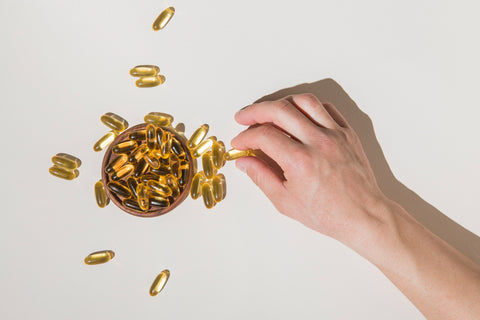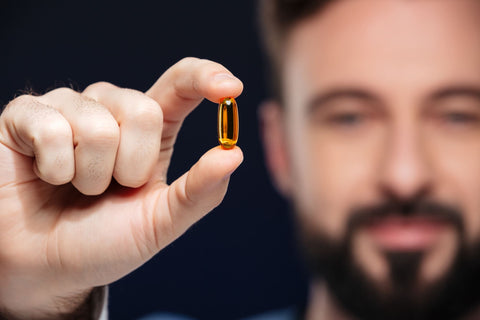Everybody needs healthy immunity, strong bones and teeth, and a nervous system. This goal, however, can’t be achieved without normal blood levels of Vitamin D.
It is an exceptionally important health-sustaining nutrient. Countless studies have linked a deficiency of the sun Vitamin to just about every disease, and, to make things worse, without proper supplementation, almost all of us in the UK have dangerously low levels of this Vitamin.
RECOMMENDED DAILY INTAKE
According to the article published in 2005 in the Journal of Nutrition, the officially recommended daily intake of 200 IU (UK and EU) and 800 IU (US) would be regarded as insufficient.
A much higher daily intake of 4,000 IU has been suggested by experts for adults and children over 10. They maintain that this amount can be safely taken daily by adults without having a blood test. This recommendation is based on various studies and the fact that just a 15-minute exposure to the sun can produce as much as 20,000 IU.
Studies suggest that adults should aim at maintaining levels at around 50 to 80ng/ml. In the case of individuals suffering from heart disease, autoimmune conditions, or cancer, it could be even higher (between 80 and 120 ng/ml).
Children under 5, should take 600-1000 IU daily, while 2,500-3000 units per day are suggested for ages 5–10.
It seems that in the case of babies and children, higher than officially recommended doses might be more effective. A proof was provided by a study conducted in Finland. Scientists gave babies a daily dose of 2000 IU in their first year of life. The dose not only didn’t cause any side effects but reduced the risk of developing type 1 diabetes later in life by 80% compared to babies who received lower daily doses (1).
SAFE UPPER INTAKE
The safe upper limit is 1,000–1,500 IU per day for infants; 2,500–3,000 IU per day for children aged 1–8 years; and 4,000 IU per day for children over 9 years of age, adults, pregnant and lactating women (2).
Please keep in mind that although the safe upper limit for supplements for adults is set at 4000 IU yet it refers to the maintenance upper safe dose.
For those that are deficient, initially a much higher dosage of 20,000-40,000 IU per day for 3 months is required. After 3 months, the maintenance daily dose of 4,000 IU is recommended.

TOXICITY
Vitamin D is fat-soluble, which means it is difficult for our body to get rid of it if we take too much. When we take high doses for a long time, it leads to excessive calcium levels in the blood.
High Vitamin D levels may lead to tissue calcification. However, the toxicity is extremely rare. It may occur from high intakes of more than 40,000 IU daily for a long period of time (over 5 months) (3).
Such mega doses can be taken safely but only for shorter periods of time (1 to 3 months) followed by the reduction of the dosage to 4,000 IU per day.
Toxicity may also occur when you take a one-time megadose of over 300,000 IU.
Toxicity may occur when blood levels of Vitamin D rise above 150 ng/ml (375 nmol/l). Because the Vitamin is stored in body fat and released into the bloodstream slowly, the effects of toxicity may last for several months after you stop taking supplements.
The main consequence of Vitamin D toxicity is a build-up of calcium in the blood (hypercalcemia). It may lead to nausea, vomiting, weakness, and frequent urination. Symptoms might progress to calcification (hardening) of arteries and pineal gland, bone and joint pain, or formation of calcium stones in kidneys.
Treatment of Vitamin D toxicity includes stopping the supplemental intake for a month, avoiding supplemental calcium, and restricting dietary calcium (especially milk and dairy products).
High doses of Vitamin D3 should never be taken for longer time without Vitamin K2 and magnesium.
Vitamin K2 (not K1) supplementation is the only antidote to Vitamin D toxicity. To prevent and treat this toxicity and calcification, take Vitamin K2 MK-7 (50mcg per every 1000 IU of cholecalciferol) and magnesium, such as Magnesium Citrate Powder (200mg twice daily).
KIDNEY FAILURE
Since people with kidney failure cannot properly activate D3 they end up with its deficiency and symptoms including brittle bones, weak immunity, etc.
Fortunately, there is also available a supplemental form known as calcitriol (vit. D4). It doesn’t require conversion in kidneys and should be prescribed for individuals with kidney failure. For those with healthy kidneys, Vitamin D3 is sufficient and effective.
JUST ONE MEGA-DOSE OF 200,000 IU OF VITAMIN D3 REDUCED SKIN DAMAGE AFTER SUNBURN
According to some research results, sometimes mega-doses are required to reverse problems associated with deficiency.
A study published in the Journal of Investigative Dermatology showed that just one mega dose of 200,000 IU of Vitamin D taken one hour after sunburn was able to decrease skin damage, redness, swelling, and inflammation. Interestingly, lower doses of the same supplement didn’t make a difference (4).
Dr Jeffrey Scott, a dermatologist specializing in skin cancer at the University Hospitals Cleveland Medical Center in Ohio, wanted to know if a one-time oral megadose of D3 could reduce the effects of sunburn on the skin.
During the experiment, participants received either a 50,000 IU, 100,000 IU or 200,000 IU dose of cholecalciferol (D3) one hour after a sunburn. As a result, only the subjects who received the one-time dose of 200,000 IU experienced a visible reduction of redness and damage (4).
Though in the study, no participants showed any side effects, yet such very large doses are not recommended without professional consultation and supervision.
A LETHAL CASE
In 2019 an elderly lady (aged 86) was prescribed 40,000 IU of Vitamin D3. The dose was supposed to be taken once a month. Unfortunately, she didn’t read the prescription and instead of once a month, she was taking 40,000 IU every day for months. As a result, she died, having suffered gastrointestinal bleeding caused by high calcium levels in her blood (hypercalcaemia) (5).
It is true that mega doses of cholecalciferol, especially when taken without magnesium and Vitamin K2, can lead to calcification of soft tissue. On the other hand, many studies demonstrated that under normal conditions, even extremely high mega doses of this Vitamin taken for more than 6 months ware never lethal. Therefore, we can only assume that the elderly lady who died as a result of prolonged overdosing of D3 already suffered from hypercalcaemia and other underlying serious health issues.
There are known cases of individuals who by accident took more than even a million units per day for several months and while they had signs of toxicity, it was reversible.
MAGNESIUM REQUIRED FOR THE ACTIVATION OF VITAMIN D3
If you are deficient in magnesium (most people are), even mega doses of D3 will not produce any health benefits. This fact was repeatedly demonstrated by scientific studies. Magnesium also appears to alter the sensitivity of tissues to cholecalciferol and helps maintain calcium balance.
For this reason, you should take well-absorbed supplemental magnesium such as Magnesium citrate powder (150-200mg twice daily). It is extremely important because without enough magnesium in the body, cholecalciferol (D3) can’t be converted into its active D4 form. It means that without magnesium this Vitamin remains inactive and can’t provide any health benefit. It also leads to magnesium deficiency triggering sleep issues, and other problems associated with magnesium deficiency.
In addition, because this Vitamin uses magnesium stored in the body it gradually leads to its deficiency (including insomnia, nervousness, anxiety, constipation, muscle cramps, heart palpitations, etc.). This is true also in the case of those who get high doses of this Vitamin from the sun.

VITAMIN K2 FOR PREVENTION OF CALCIFICATION
Another requirement for proper absorption of Vitamin D is 100–200 mcg of Vitamin K2 MK-7 (Derived from Natto) every day. It not only maximizes the benefits of supplemental cholecalciferol but also prevents the potential risk of toxicity caused by regular intake of high doses.
Vitamin K2 activates a special protein that helps direct calcium to the bones. In this way, it keeps calcium away from the undesirable areas (pineal gland, kidneys and arteries) thus eliminating the risk of calcification of these organs.
Vitamin K2, on the other hand, make sure Vitamin D stores calcium in bones and not in the soft tissue thus preventing hardening (calcification) of arteries, pineal glands and other organs.
INTERACTIONS
High supplemental intake of Vitamin A may increase Vitamin D deficiency. The lower the level of Vitamin A the more cholecalciferol can accumulate in the liver.
At the same time, Vitamin A can prevent cholecalciferol toxicity (and vice versa) when high doses of supplemental cholecalciferol are taken for a long time.
CAFFEINE INCREASES DEFICIENCY
Caffeine products (coffee, tea, green tea, chocolate, cola drinks, etc.) can significantly reduce the absorption of cholecalciferol.
RELATED ARTICLES
SOURCES
- Hyppönen, E. et al. Intake of vitamin D and risk of type 1 diabetes: a birth-cohort study. The Lancet 2001; 358;1500-1503.
- https://diabetesjournals.org/spectrum/article/24/2/113/32324/Vitamin-D-and-Diabetes#ref-39
- https://selfhacked.com/blog/vitamin-d-dosage-sources-deficiency-toxicity/
- https://www.grassrootshealth.net/blog/no-toxicity-seen-5000-50000-iu-vitamin-d-per-day/
- Oral Vitamin D Rapidly Attenuates Inflammation from Sunburn: An Interventional Study - PubMed (nih.gov)
- https://www.independent.co.uk/news/uk/home-news/vitamin-d-overdose-care-home-inquest-yorkshire-guiseley-eileen-cowles-coroner-a8828506.html
Any information or product suggested on this website is not intended to diagnose, treat, cure or prevent any medical condition. Never disregard medical advice or delay in seeking it because of something you have read on this website. Consult your primary healthcare physician before using any supplements or making any changes to your regime.




